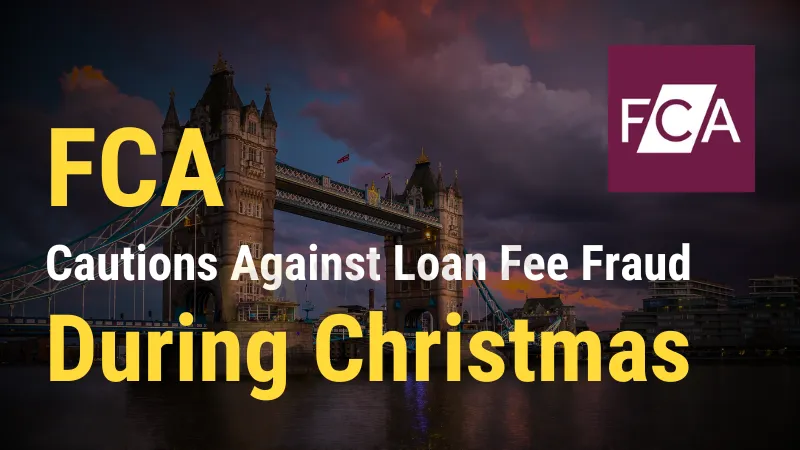简体中文
繁體中文
English
Pусский
日本語
ภาษาไทย
Tiếng Việt
Bahasa Indonesia
Español
हिन्दी
Filippiiniläinen
Français
Deutsch
Português
Türkçe
한국어
العربية
FCA Cautions Against Loan Fee Fraud During Christmas
Abstract:Protect against loan fee fraud this Christmas with the FCA's advice. Stay vigilant on spending and borrowing, and get support from Debt Free Advice.

The United Kingdom The Financial Conduct Authority (FCA) has issued a stern public warning about the growing possibility of loan fee fraud, particularly during the holiday season. This warning comes at a time when many UK citizens, especially parents with small children, are feeling pressured to spend more than they can afford on Christmas festivities.
Rising Concerns Over Christmas Expenditures
Recent findings reveal a startling scenario: approximately 40% of adults in the UK are anxious about their ability to manage the expenses associated with Christmas. This concern escalates to 52% among parents with young children under the age of 18. Consequently, over a quarter (29%) of these parents have either already borrowed money or plan to do so to fund their Christmas spending, thereby making themselves vulnerable to scams like loan fee fraud.
The Threat of Loan Fee Fraud

Loan fee fraud is a particularly insidious type of scam where individuals are tricked into paying fees for loans that they ultimately never receive. On average, victims lose about £255 to such frauds. The FCA emphasizes that with the current financial strains, many households may fall prey to these scams.
FCA's 3-Step Check Against Loan Scams
To safeguard consumers, the FCA has introduced a simple yet effective 3-step check:
Be Cautious of Cold Calls and Emails: Unsolicited contact may be a sign of a scam.
Upfront Fee Requests: Be wary if you're asked to pay fees before receiving a loan.
Unusual Payment Demands: Requests for quick or unconventional payments are red flags.
The FCA urges everyone to verify the legitimacy of loan offers by consulting their Financial Services Register and visiting the loan fee fraud page for more information.
Partnership with Debt-Free Advice
In its commitment to support individuals facing financial challenges, the FCA has partnered with Debt Free Advice, a coalition led by Toynbee Hall. This collaboration aims to offer assistance and guidance to those struggling with debt, especially in these high-pressure holiday periods.
Statements from FCA and Debt-Free Advice Representatives
Therese Chambers, the Executive Director of Enforcement and Market Oversight at the FCA stresses the importance of the public being vigilant against fraudsters who exploit the festive season. “Fraudsters will take advantage even of parents desire to give their children a good Christmas. Remember the 3-step check and protect yourself and your loved ones from loan fee fraud,” she advises.

Matt Dronfield, Managing Director of Debt Free Advice, highlights the societal pressures that lead to financial strain and increased debt during Christmas. He notes the adverse impact of such debt on families, affecting their financial stability, mental health, and overall well-being.
Risk of Unauthorised Firms
The FCA also warns that dealing with unauthorized firms means consumers will not have the protection of the Financial Ombudsman Service or the Financial Services Compensation Scheme (FSCS) if things go wrong.
Learn More and Stay Informed
Those looking for further information and tools on avoiding financial scams and making educated choices might benefit from visiting https://www.wikifx.com/en. This platform provides a plethora of financial information, allowing users to confidently navigate the complexity of the financial world.
In Conclusion: A Call for Vigilance
As the festive season approaches, the FCA‘s message is clear: Stay alert to the risks of loan fee fraud. By following the FCA’s guidelines and utilizing resources like those offered by Debt Free Advice and exploring https://www.wikifx.com/en, individuals can better protect themselves and their families from financial scams and undue stress during this festive season.
Bottom Line
The FCA's efforts in raising awareness about loan fee fraud, especially during the financially demanding Christmas period, underscore the importance of being cautious and well-informed. By staying vigilant and following the FCA's advice, consumers can safeguard themselves against potential scams and enjoy a safer, more secure holiday season.

Disclaimer:
The views in this article only represent the author's personal views, and do not constitute investment advice on this platform. This platform does not guarantee the accuracy, completeness and timeliness of the information in the article, and will not be liable for any loss caused by the use of or reliance on the information in the article.
Read more

The Hidden Checklist: Five Unconventional Steps to Vet Your Broker
Forex broker scams continue to evolve, employing new tactics to appear credible and mislead unsuspecting traders. Identifying these fraudulent schemes requires vigilance and strategies beyond the usual advice. Here are five effective methods to help traders assess the legitimacy of a forex broker and avoid potential pitfalls.

Malaysian-Thai Fraud Syndicate Dismantled, Millions in Losses Reported
The Royal Malaysia Police (PDRM) has received 26 reports concerning the Nicshare and CommonApps investment schemes, both linked to a major fraudulent syndicate led by a Malaysian citizen. The syndicate’s activities came to light following the arrest of its leader by Thai authorities on 16 December.

SEC Approves Hashdex and Franklin Crypto ETFs on Nasdaq
The SEC has approved crypto index ETFs by Hashdex and Franklin Templeton, including Bitcoin and Ethereum, marking a milestone in crypto asset investment.

North Korean Hackers Steal $1.3bn in Cryptocurrency in 2024
Over $2.2bn in cryptocurrency stolen in 2024, with North Korean hackers accounting for $1.3bn. Discover how cyber theft impacts the evolving crypto landscape.
WikiFX Broker
Latest News
ASIC Sues Binance Australia Derivatives for Misclassifying Retail Clients
Top 10 Trading Indicators Every Forex Trader Should Know
WikiFX Review: Is FxPro Reliable?
Malaysian-Thai Fraud Syndicate Dismantled, Millions in Losses Reported
Trading frauds topped the list of scams in India- Report Reveals
AIMS Broker Review
The Hidden Checklist: Five Unconventional Steps to Vet Your Broker
YAMARKETS' Jingle Bells Christmas Offer!
WikiFX Review: Something You Need to Know About Markets4you
Revolut Leads UK Neobanks in the Digital Banking Revolution
Currency Calculator


